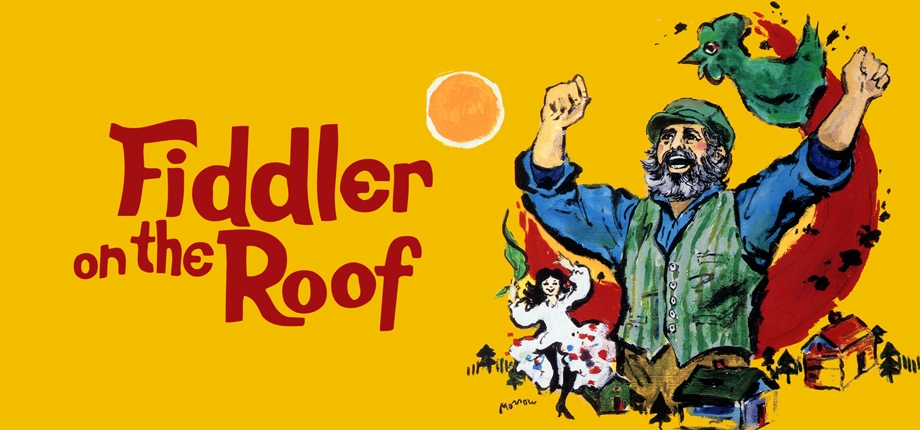Fiddler on the Roof“Fiddler on the Roof” Tour Offers Charming Rendition of Classic Musical By Ian C. Mills
By Ian C. Mills
The 2015 Broadway Revival of “Fiddler On the Roof,”produced by Chicago-based Jam Theatricals and Tony Award-winning director Bartlett Sher, made its way to Hartford’s Bushnell Center for the Performing Arts in a limited engagement from Nov. 6 to 11, its fourth stop in the tour that launched earlier this year in Philadelphia.
With its rousing dance numbers this ‘Fiddler’presents a charming production with a contemporary feeling.
Since ‘Showboat inaugurated the genre in 1927, ‘Fiddler’ is one of the longest-running musicals in Broadway history. It premiered in 1964 and ran until 1972 and has been revived once in each of the past five decades.
It is based on the tale of “Tevye and His Daughters,” one of a series of stories written in Yiddish between 1894 and 1914 by Sholom Aleichem about Jewish life in rural Russia at the turn of the 20th century. The storyline takes place in the fictional shtetl of Anatevka in an area of Eastern Europe annexed by the pre-revolutionary Russian Empire, generally the only region in the Empire where Jews were permitted to live. It roughly corresponds to what are today parts of Lithuania, Belarus, Poland, Moldova and Ukraine. A shtetl was a small town or village, inhabited mostly, but not exclusively, by Jews formerly found in Eastern Europe and Western Russia.
It is 1905; Czar Nicholas II is in power and his Army’s soldiers have been harassing Jews for quite some time, in anti-Semitic campaigns known as pogroms. The character Tevye (played by Yehezkel Lazarov) is a hard-working dairy-man scraping out a living to support his wife, Golde (played by Maite Uzal), and five daughters. At the onset of the play, Tevye explains that the people of his village are steeped in age-old traditions that keep them going through thick and thin. Every man wears a headpiece and a prayer shawl; all marriages are arranged through the town’s matchmaker, Yente (Carol Beaugard). That is until the day she shows up to announce a match for Tevye’s oldest daughter, Tzeitel, to the town’s prosperous but much older butcher, Lazar Wolf (Jonathan Von Mering).
You see, Tzeitel (Mel Weyn) wants to marry her life-long best friend Motel (Jesse Weil), the village’s poor tailor who has been saving up forever to buy a sewing machine. Tevye protests that he is “just a poor tailor!” Motel exclaims that “even a poor tailor is entitled to some happiness.”
While Tevye sees the merit in his argument and realizes that Tzeitel loves Motel dearly, he is hesitant to buck tradition and also wonders how to break the news of a marriage for love— heaven forbid! — to his wife. He concocts an elaborate tale of his mother-in-law appearing in a dream to warn him of dire consequences if Tzeitel does not marry Motel; Golde is convinced by the tale.
Tradition is tested again when his second daughter, Hodel, falls in love with a bright university student, Perchik (Ryne Nardecchia) from Kiev, who Tevye hired to educate his daughters. This time around, Tevye has come to accept that social change is afoot, and that marriage for love is good; he gives his blessing. However, when his third daughter, Chava, wishes to marry a non-Jew, Tevye cannot bear the thought of her marrying outside their religion, and sadly disowns her.
Meanwhile, the local military constable, who has known Tevye for decades and is friendly with him, warns Tevye that his unit has received orders from superiors that the soldiers must cause some “mischief” in Anatevka, intended to stoke fear among the villagers. It happens at the wedding party for Tzeitel and Motel, when soldiers crash the party, overturn tables and tear up some of the wedding presents. It’s an omen of worse things to come; eventually, every Jewish villager is told they have three days to pack up and leave Anatevka forever. Many opt to join relatives or friends in America.
A contemporary lesson one can glean from this play, given today’s climate on immigration, both in the U.S. and in other countries, is that immigrants have a choice; refugees do not.
‘Fiddler’is a charming and often very funny tale, replete with touching moments that can bring a tear to the eye. Throughout the play, some of the most entertaining moments are the masterfully choreographed dance routines, arranged by choreographer Hofesh Shechter, especially the one during the wedding party where four guests perform a Russian dance with bottles balanced on their heads.
If one has previously seen the Tevye character portrayed by an older, more portly, and baritone actor such as Zero Mostel (in the original 1964 Broadway production) or Chaim Topol (in the 1971 film adaptation), then the svelte and young-ish 44-year-old Lazarov may disappoint somewhat. Similarly, one might have expected to see a more matronly Golde than the character played by Uzal. But this cast brings an international “flavor” to the age old story of what happens when the past and the future collide.
Featuring the Broadway classics “To Life,” “If I Were a Rich Man,” “Sunrise, Sunset,” “Matchmaker, Matchmaker” and “Tradition,” the traveling production of “Fiddler on the Roof”will introduce a new generation to this uplifting celebration of life, love, and family.
The nationwide tour of “Fiddler on the Roof” continues through August of 2019. Visit www.fiddlermusical.com/ticket-infofor more information.







